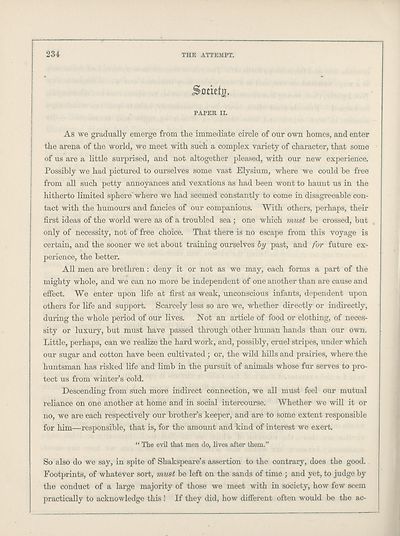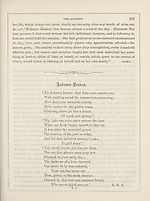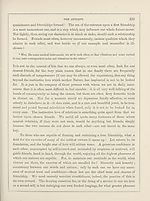Download files
Complete book:
Individual page:
Thumbnail gallery: Grid view | List view

234 THE ATTEMfT.
Sowfu.
PAPER II.
As we gradually emerge from the immediate circle of our own homes, and enter
the arena of the world, we meet with such a complex variety of character, that some
of us are a little surprised, and not altogether pleased, with our new experience.
Possibly we had pictured to ourselves some vast Elysium, where we could be free
from all such petty annoyances and vexations as had been wont to haunt us in the
hitherto limited sphere where we had seemed constantly to come in disagreeable con¬
tact with the humours and fancies of our companions. With others, perhaps, their
lirst ideas of the world were as of a troubled sea ; one which must be crossed, but
only of necessity, not of free choice. That there is no escape from this voyage is
certain, and the sooner we set about training ourselves by past, and for future ex¬
perience, the better.
All men are brethren : deny it or not as we may, each forms a part of the
mighty whole, and we can no more be independent of one another than are cause and
effect. We enter upon life at first as weak, unconscious infants, dependent upon
others for life and support. Scarcely less so are we, whether directly or indirectly,
during the whole period of our lives. Not an article of food or clothing, of neces¬
sity or luxury, but must have passed through other human hands than our own.
Little, perhaps, can we realize the hard work, and, possibly, cruel strijies, under which
our sugar and cotton have been cultivated ; or, the wild hills and prairies, where the
huntsman has risked life and limb in the pursuit of animals whose fur serves to pro¬
tect us from winter's cold.
Descending from such more indirect connection, we all must feel our mutual
reliance on one another at home and in social intercourse. Whether we will it or
no, we are each respectively our brother's keeper, and are to some extent responsible
for him—responsible, that is, for the amount and kind of interest we exert.
" The evil that men Jo, lives after them."
So also do we say, in spite of Shakspeare's assertion to the contrary, does the good.
Footprints, of whatever sort, must be left on the sands of time ; and yet, to judge by
the conduct of a large majority of those we meet with ui society, how few seem
practically to acknowledge this ! If they did, how different often would be the ac-
Sowfu.
PAPER II.
As we gradually emerge from the immediate circle of our own homes, and enter
the arena of the world, we meet with such a complex variety of character, that some
of us are a little surprised, and not altogether pleased, with our new experience.
Possibly we had pictured to ourselves some vast Elysium, where we could be free
from all such petty annoyances and vexations as had been wont to haunt us in the
hitherto limited sphere where we had seemed constantly to come in disagreeable con¬
tact with the humours and fancies of our companions. With others, perhaps, their
lirst ideas of the world were as of a troubled sea ; one which must be crossed, but
only of necessity, not of free choice. That there is no escape from this voyage is
certain, and the sooner we set about training ourselves by past, and for future ex¬
perience, the better.
All men are brethren : deny it or not as we may, each forms a part of the
mighty whole, and we can no more be independent of one another than are cause and
effect. We enter upon life at first as weak, unconscious infants, dependent upon
others for life and support. Scarcely less so are we, whether directly or indirectly,
during the whole period of our lives. Not an article of food or clothing, of neces¬
sity or luxury, but must have passed through other human hands than our own.
Little, perhaps, can we realize the hard work, and, possibly, cruel strijies, under which
our sugar and cotton have been cultivated ; or, the wild hills and prairies, where the
huntsman has risked life and limb in the pursuit of animals whose fur serves to pro¬
tect us from winter's cold.
Descending from such more indirect connection, we all must feel our mutual
reliance on one another at home and in social intercourse. Whether we will it or
no, we are each respectively our brother's keeper, and are to some extent responsible
for him—responsible, that is, for the amount and kind of interest we exert.
" The evil that men Jo, lives after them."
So also do we say, in spite of Shakspeare's assertion to the contrary, does the good.
Footprints, of whatever sort, must be left on the sands of time ; and yet, to judge by
the conduct of a large majority of those we meet with ui society, how few seem
practically to acknowledge this ! If they did, how different often would be the ac-
Set display mode to: Large image | Transcription
Images and transcriptions on this page, including medium image downloads, may be used under the Creative Commons Attribution 4.0 International Licence unless otherwise stated. ![]()
| Ladies' Edinburgh Debating Society publications > Attempt > Volume 3 > (248) Page 234 |
|---|
| Permanent URL | https://digital.nls.uk/104346208 |
|---|
| Attribution and copyright: |
|
|---|

